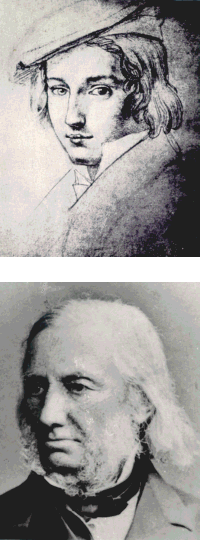Startpage » Collect + Preserve » Collections » Estates and Autographs » Johann Heinrich Friedrich Karl Witte
Estates and Autographs
Johann Heinrich Friedrich Karl Witte
Johann Heinrich Friedrich Karl Witte, born on July 1, 1800 in Lochau near Halle (Saale) as the son of the pastor Karl Heinrich Gottfried Witte and died on March 6, 1883 in Halle (Saale), was systematically taught and educated by his father from an early age. At the age of eight, he read Latin and Greek writers, solved complicated mathematical problems and had an enormously broad general education. His father was attacked by his contemporaries for this “training of the child prodigy”. In retrospect, however, this education by his father does not seem inappropriate for the highly gifted, inquisitive child.
As a 10-year-old, Witte passed his school-leaving examination in Leipzig and enrolled at Leipzig University. Witte received financial support from the King of Westphalia, so he transferred to the University of Göttingen to study mathematics and philology. In 1813, he obtained his doctorate at the University of Giessen with the publication Conchoidis Nicomediae aequatio et indoles. Witte continued his studies in Heidelberg, where he mainly attended law lectures.
On August 20, 1816, Witte completed his legal studies with a regular doctoral promotion. His dissertation dealt with the usufruct. In 1817, he habilitated at the University of Berlin. Witte did not exercise his right to hold legal lectures, but instead – with the support of King Friedrich Wilhelm III – undertook a study trip to Italy. However, Witte was less interested in Roman law than in Italian literature, especially Dante.
In 1821, Witte returned to Germany after also visiting France and England. Following an invitation from the Minister of Culture, he went to Breslau as a private lecturer, where he was appointed extraordinary professor in 1823 and full professor in 1829.
Since his academic qualifications were called into question, Witte submitted another dissertation (De Guilelmi Malmesburiensis codice legis romanae wisigothorum) – presumably in 1831. In 1833, the Prussian Ministry of Culture transferred him to the University of Halle, where a professorship for Roman Law had become vacant.
Compared to his predecessor, Professor Mühlenbruch, and other legal scholars, the faculty certified that despite his high knowledge, he lacked teaching success for years after he took office, as Witte possessed neither a “pleasing appearance” nor “outward eloquence.” Witte’s focus on Prussian Common Law, for which he presented an extensive and recognized monograph (“Das Preußische Intestat-Erbrecht, aus dem gemeinen deutschen Recht entwickelt,” 1838), did not increase student attendance either. From 1855 onwards, Witte also served as the chair of the university tribunal and additionally acted as a judge at the district and regional court in Halle.
Witte gained high recognition as a translator of Dante’s Divine Comedy and as the editor of a critical edition of the text (awarded the Knight’s Cross of the Papal Pius Order, the Tuscan Leopold Civil Merit Order, and the Knight’s Cross of the Franz Joseph Order). In 1878, Witte founded the German Dante Society, of which he published the first three yearbooks.
Witte’s written estate encompasses material collections for the encyclopedia and methodology of law (1830) related to Roman legal history, the Code of Justinian, and Gaius. After Witte’s death, it was entrusted to the University Library of Halle (Saale) for safekeeping by his son in April 1883 (manuscript note from 18.5.1883 by Otto Hartwig in the estate).
It received the signature Yi 11. This is also noted in the directory “Gelehrten- und Schriftstellernachlässe in den Bibliotheken der Deutschen Demokratischen Republik” Part I, Berlin 1959, on p. 94, no. 686.
2 boxes
The following list contains researchable estates that have been prepared for consultation in the reading room for historical collections and are indexed in a detailed repertory:
Estates
| Yi 11 I | Materialsammlung zur Römischen Rechtsgeschichte. o.O.o.J. 368 Blatt, 4° und 8°; ungebunden. |
| Yi 11 II | Materialsammlung zum Erbrecht. o.O.o.J. 37 Blatt, 4°; ungebunden. |
| Yi 11 III | Juristische Notizen und Excerpte vorwiegend zum Römischen Recht. o.O.o.J. 585 Blatt, überwiegend 4°; ungebunden. |
| Yi 11 IV | Der Prozeß i im Römischen Recht. Materialsammlung – o.O.o.J. 379 Blatt, 4°; ungebunden. |
| Yi 11 V | Allgemeines Landrecht. o.O.o.j. 121 Blatt, 4°; ungebunden. |
| Yi 11 VI | Die Institutionen des Justinian. o.O.o.J. 34 Blatt, 4°; ungebunden. |
| Yi 11 VII | Zu Gajus. [Römischer Jurist der zweiten Hälfte des 2. Jh. nach Chr. Seine “Institotiones” – Anweisungen, Belehrungen -, ein Elementarwerk in vier Büchern für den Unterrichtsgebrauch (um 161), sind das einzige fast vollständig überlieferte Werk der klassischen römischen Rechtswissenschaft. Das Original wurde von B. G. Niebuhr 1816 auf einem Palimpsest der Stiftsbibliothek Verona entdeckt.] o.O.o.J. 91 Blatt, 4°; ungebunden. |
| Yi 11 VIII | Römisches Recht. o.O.o.J. 293 Blatt, 4°; ungebunden. |

